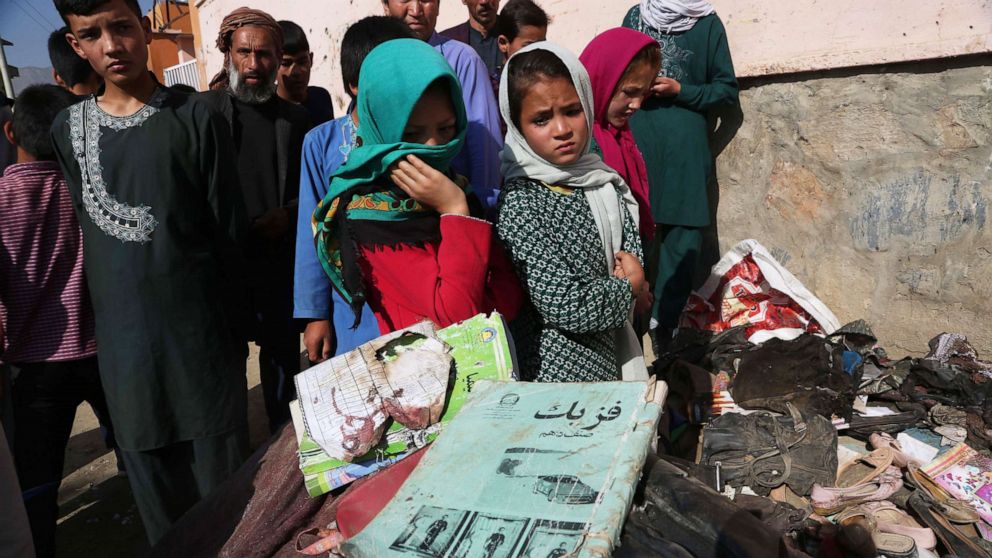'I'm very scared': Afghan girls, women fear Taliban's return to power as US troops withdraw
What Seddiqa Mahmoodi remembers most from that day were the screams.
When a girls' school outside of Kabul was attacked last month in a triple bombing, the 17-year-old student sustained serious injuries to her leg and hand, only recently released from the hospital.
More than 85 people, dozens of them girls and young women, were killed in the attack against the persecuted Hazara ethnic minority -- one that seized headlines around the world for being so especially appalling amid a spike in violence in Afghanistan as the U.S. withdraws its last troops.
"All I remember was the scream I was hearing from the fellow girls and the bodies scattered around the street," Mahmoodi told ABC News. "It's really, really bad. I can't say. ... When I remember this happens for me, I'm very scared about it. I'm very scared again it's happened."

With U.S. forces exiting the country after nearly two decades of fighting, the Taliban is on the offensive again, gaining control of more than 50 districts across the country since President Joe Biden's announcement, according to the war monitor the Long War Journal.
As the group appears poised to take power again by force, Afghan officials, women's rights activists and U.S. lawmakers have warned that women and girls face a return to the country's grim past, notorious for its harsh treatment of women.
"Women are deeply concerned that women's rights do not become the price to be paid for peace," Mary Akrami, a prominent women's rights activists in Kabul, told the United Nations Security Council session Tuesday. "We want a dignified and just peace, not a surrender to the Taliban or other violent extremist groups."
Akrami and other women have urged the Trump and now Biden administrations to include more women in the peace process, which excluded the Afghan government in negotiations between Taliban leadership in Doha, Qatar, and U.S. special envoy, Ambassador Zalmay Khalilzad.
Women have been part of the Afghan national delegation that has met on and off again with the Taliban in peace negotiations since last September, although those talks have been deadlocked since the sides set an agenda.
The militant group has said that they will accept women in certain spaces, which Khalilzad has touted as well.

Sayed Akbar Agha, a former Taliban leader from when the group was in power prior to the 2001 U.S. invasion, told ABC News Tuesday he was "in favor of an inclusive government ... where every tribe and every population of Afghanistan seated represents in that government, so that kind of government, even the female will be part of it."
In recent months and years, however, a long string of deadly attacks targeting women, assassinating prominent female leaders and closing girls' schools have belied public assurances like Agha's.
The Taliban denied responsibility for the attack on Mahmoodi's school, with U.S. officials saying instead it had the hallmarks of the Islamic State terror group, which has a strong footing in Afghanistan and one that U.S. officials fear will grow after an American exit.
But regardless of who was responsible, Mahmoodi told ABC News that she fears for her life, even as she hopes to finish her education and pursue a career in journalism.
"I just want to continue my lessons, and I want to finish my lessons. I want to be the future, go (as a) journalist," she said, in order to "say the facts for people."
Asked whether she worries about her future and any chances for an education with American troops gone, she said yes.
"Maybe the Taliban attack," she said. "The security camp can't help me."

That fear is born out of real experience for Kamila Sidiqi, a prominent entrepreneur who has promoted female economic empowerment even during the Taliban's previous rule.
"It was very difficult for a woman to work from there and to go to university or school or do some business, it was very difficult for a woman," she told ABC News Tuesday, detailing how she worked during Taliban rule as a dressmaker to support her family and dozens of others.
After 20 years of international influence, Afghan women are more active, educated and empowered, she said, and they will not give back those rights so easily. But the rapidly deteriorating security situation has her and many others on edge and asking for U.S. support.
"It is unbelievable after 21 years and after all this achievement and support from the international community -- especially America -- it is unbelievable now the situation that I, we experience these days," she said.
"We need support of America to be here for some time, for the situation, for peace come this country, and for people feel safe, we need America to be here," she added.
The State Department has said it will provide additional financial support for women and girls' empowerment and vocally stand up for their rights, including as it backs the Taliban and Afghan government's peace negotiations.
But the administration has made clear this week that U.S. troops will not be there, and nothing will reverse Biden's decision to withdraw.
"Nothing has changed about two things. One, we will complete the withdrawal of all U.S. forces out of Afghanistan, with the exception of those that will be left to protect the diplomatic presence, and two, that it will be done before early September," Pentagon spokesperson John Kirby said Monday.




